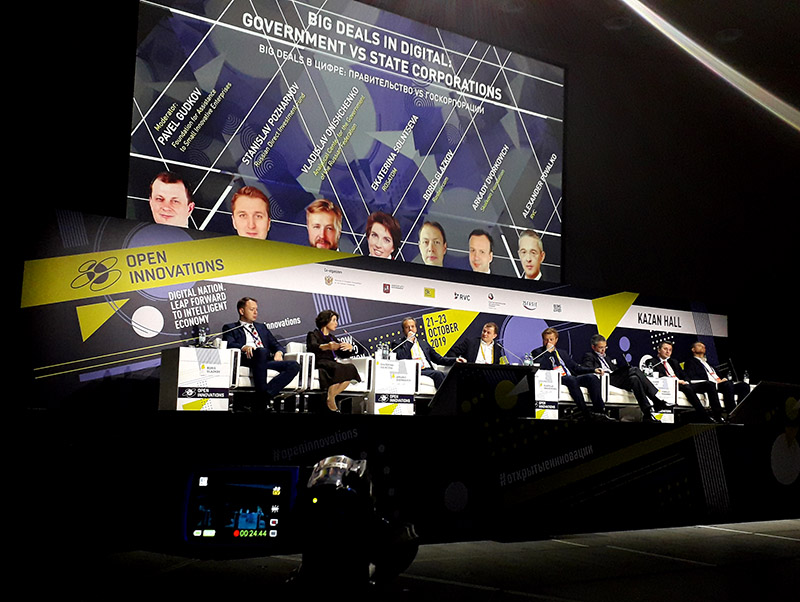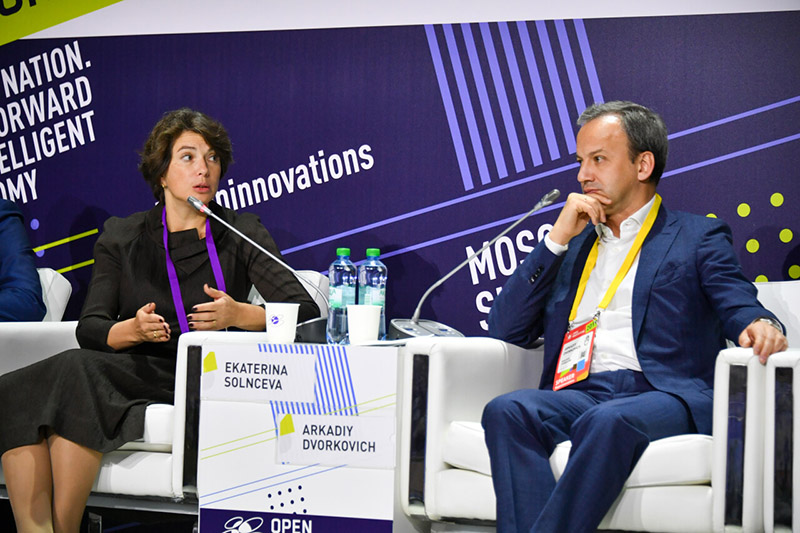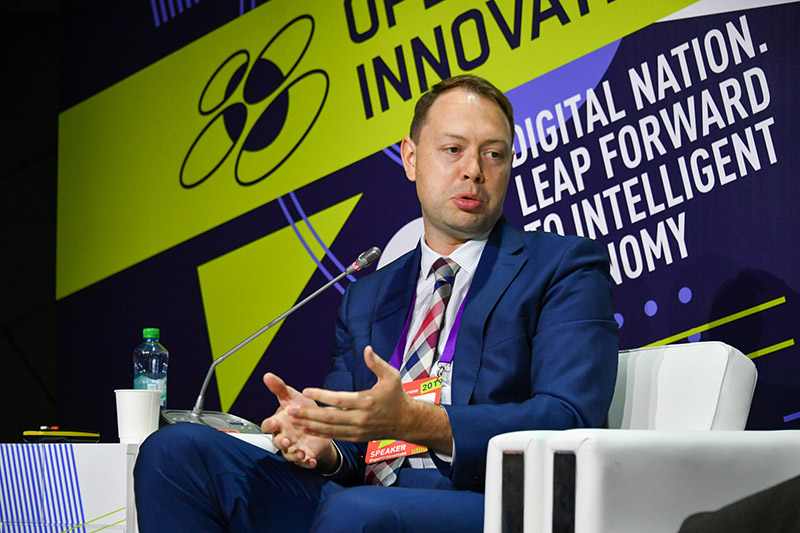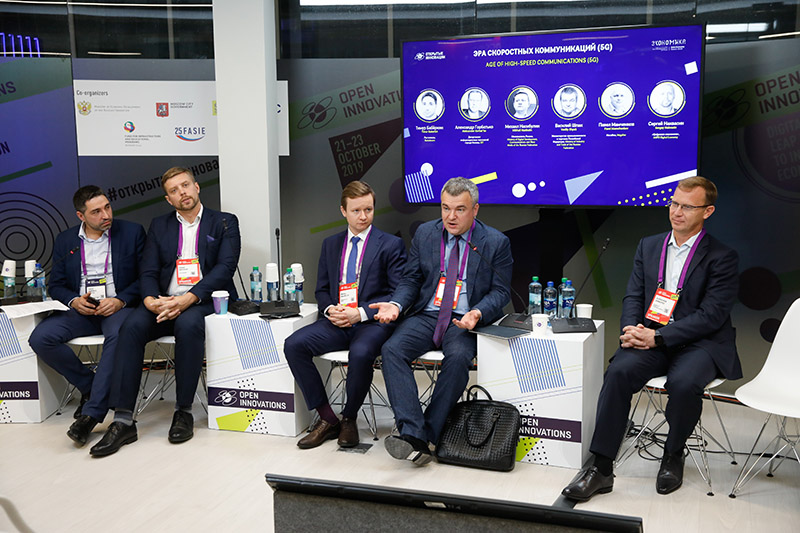[Analytics] What car Russia could take in a rushing 5G train?

Вuring the session 'Big Deals in Digital: Government VS State Corporations' as part of the Open Innovations 2019 Forum at the Skolkovo Innovation Center. Photo by the Pan Pacific Agency.
In 2019, the term “cross-cutting digital technologies” appeared in the legal field of Russia, denoting everything that should once again change the life of all mankind: AI, neural networks, virtual reality, robotics, blockchain, 5G etc. Of course, these trends couldn’t be ignored at the International Forum ‘Open Innovations’, which was held in Moscow this week. On the example of the 5G, the most promising technology, Pan Pacific Agency tried to understand how many deep and fast digitalization awaits Russia in the nearest future.
Seven start points for Russian digital economy
To show a serious intention, the Russian authorities named major state-owned companies responsible for the development of each of the areas of the digital economy. The funding from the budget was promised too. Govt is ready to provide 230B rubles ($3.6B). Almost 1 trillion rubles (about $15.6B) are required for the digitalization of Russia for the next five years. Russian Ministry of Digital Development, Communications and Mass Media published detailed roadmaps on 7 directions of the digital economy’s development on October 10.
5G is one of the most discussed and promising technology in the world. Self-driving vehicles, the Internet of things (IoT), smart cities, robotics, VR&AR and many other future technologies are associated with its development. The third and final day of ‘Open Innovations’ Forum began with a dialogue between the govt and state corporations, in which on the one hand large Russian companies (Rosatom, Rostelecom, Rostec) came together, and on the other – institutions for business development and support.
‘Big Deals in Digital: Government VS State Сorporations’ was the title of the plenary meeting attended by former deputy PM Arkady Dvorkovich, the chairman of the Skolkovo Foundation and still a man of gravitas in the Russian govt. Mr. Dvorkovich is a close figure to PM Dmitry Medvedev, who a day earlier discussed obstacles to the development of the digital economy and a fate of the self-driving cars in Russia at the ‘Open Innovations’ Forum, as the Pan Pacific Agency reported.
As a former high-ranking representative of the Russian govt, Arkady Dvorkovich allowed himself to compare Russia’s current intentions to develop the digital economy with the intentions of other states. “We are talking about projects that are related to the cross-cutting or end-to-end technologies: AI, quantum technologies, modern telecommunications technologies. In other countries and continents, billions or tens of billions of dollars are being spent for this purpose. Governments give billions, companies give tens of billions. In China, for example, Huawei, not the Communist party of China, despite the high role of the state in the economy, makes decisions about the development of the digital economy. But no one forces these decisions to be executed. Yes, the Chinese government promotes and protects this company everywhere, including the trade war with the United States. But the decisions are made by the company itself,” Arkady Dvorkovich said.
“I like large state-controlled companies in Russia. They are working more and more efficiently. But next to them, as a rule, there are large private companies. It is not very clear to me how state-owned companies will ensure equal conditions of competition for state support in the areas of development of the digital economy, for which they agreed to be responsible after the conclusion of agreements with the government. Probably, it will turn out. It must be done. Otherwise we will fail,” Arkady Dvorkovich said. The Skolkovo Foundation is ready to conduct an independent examination of digital economy development projects in Russia, he added.
“It’s very important to solve three problems. The first is constant external evaluation, examination of what is being done within the framework of projects. The second is motivation for those who will implement technologies. Yes, we can develop technologies. But then you can face the fact that there is no return on investment from technology, and no one wants to implement them. And the third is the technological culture, which will mean a willingness to develop and use these technologies,” Arkady Dvorkovich said.

“We do not have a task to preserve competition for the sake of preserving competition,” Ekaterina Solntseva, Director of digitalization of the state corporation Rosatom, replied to Arkady Dvorkovich. Rosatom, as described in the company’s agreement with the government, is responsible for building a quantum computer in Russia. “When a company makes a commitment, it is impossible to detach from the authority. If we are responsible for the result, it means that we organize all the working process. However, no company, even a large one, can do it alone,” the top manager continued.
“What’s going on, and we know it. State corporations, which were identified by the Russian government as responsible for the development of a certain direction of the digital economy, which signed the agreement, said to other companies successfully engaged in development in this sector: ‘Sell us your business, or we will not work with you.’ It’s not Rosatom, but other companies do that. Do you think it is normal?” Arkady Dvorkovich asked.
“I’ll be honest. All the plans for the development of the digital economy of Russia, roadmaps, require the creation of an entire ecosystem of many companies around each project,” the representative of Rosatom assured.
However, the heated discussion on the sidelines of the ‘Open Innovations’ Forum proves that few development institutions believe that Rosatom is trying to prevent participation of other companies while implementing a project to create a quantum computer in Russia. This idea was announced by Alexander Povalko, CEO of Russian venture company. Ekaterina Solntseva denied this.
5G by Russia: whose equipment will be used
The conflict of interests in the development of the digital economy of Russia may persist in those areas where there are monopolists-state corporations. But mobile communication in the country is provided by four companies: the “big three” VimpelCom, MTS, MegaFon and the fourth Tele2. Rostelecom, which is the largest fixed-line operator, and Rostec state Corporation have been appointed responsible for the development of fifth-generation communications. Both companies are controlled by the authorities and closely connected with the Government.
«Rostelecom is going to build 5G infrastructure together with the big three operators. Whom of them we can absorb? It’s unknown who will win. The condition of competition support will be fulfilled by creating a joint venture with equal shares from the largest telecommunications companies. We hope the government will help us to deploy the frequencies. Negotiations are difficult, it is clear. The level of trust to each other in the telecommunications market of Russia is low now. But the concept is like that. As for services, in the 5G sphere, all services are extremely innovative. We will think here for the future, there is no mature market at the present. We will support such projects, we will take responsibility for the project to grow”, Boris Glazkov, vice president for strategic initiatives at Rostelecom, said.

Russia understands how important it is to join the race on 5G equipment development “and somehow mark the role of the country on the world stage in this area,” Mikhail Nasibulin, director of the department of coordination and implementation of projects on the digital economy of the Ministry of Communications of Russia, admitted at the ‘Open Innovations’ Forum. “The state supports developers of 5G solutions directly through subsidies, and R&D support for the development of 5G solutions is gived through the Russian venture capital company and the FASIE,” the official listed.
According to his words, the Russian Government intends to allocate large complex projects related to the development of technologies into separate tracks by 2020. A major technology company will run each track. For 5G it is the state corporation Rostec and the company of fixed communication Rostelecom. Testing 5G sites creation, where manufacturers of equipment, software and telecom operators will be able to work together, should the first step, according to the representative of the Ministry.
By 2023, Russia should begin production of its own 5G equipment, the state and state-owned companies overseeing the project agreed. But what can be done to ensure that this date does not remain only on paper?
Top Manager of ANO “Digital economy” Sergey Nakvasin says that 5G technology on a global scale, according to experts, is ready for implementation on the TRL scale by 8 points out of 9. Russian equipment manufacturers are estimated at only 3 points. The Technology Readiness Level scale was developed by NASA to assess the readiness to begin transferring experimental space-oriented developments into real production. Now the TRL scale is used by all areas related to technology. Level 8 means “final confirmation of the health of the sample, the development of a functioning real system is completed.” Level 3 means “the model sample is received, its key characteristics are demonstrated”. The rise of as many as five steps is between them.
“The question arises: when Russia will have 5G, and we will have it, then whose will it be? Will it be built on the basis of Russian developments or developments of foreign partners? I have a bad feeling that it can only be foreign equipment, if the timing of the introduction of 5G will be compressed,” Sergey Nakvasin said. According to the plan of the authorities, by 2021 the level of TRL on 5G technology in Russia should grow to 8. “Our colleagues from other countries took five years, starting from 2014, to overcome these steps,” Sergey Nakvasin recalled. Russia’s plans to develop 5G are very ambitious, he concluded.
Security VS development or Development VS market?
The Russian state budget is ready to invest in the development of 5G technology, Vasily Shpak, director of the department of electronic industry at the Ministry of industry and trade, said. Moreover, it is in the interest of any state to have domestic equipment in key nodes of decision-making systems, which include telecommunications networks, he added.
“But we do not have the right to invest public funds in the production of equipment without confirmed demand from Telecom operators. Unfortunately, today we have not received such information from Telecom operators and the Ministry of communications. Operators say that there are no commercial cases on the use of 5G in Russia, although they confirm the need for testing the technology. The Russian industry is ready to fulfill the order for the production of equipment for the 5G networks, if it is clear: what equipment is needed, what characteristics should be,” the official assured. According to him, due to the lack of parameters for a serious order in Russia, 5G is now developing only at the level of startups that support development institutions.

“The digital giants, Google, Amazon, have evolved because of the opportunities that networks have given. In August, four 5G communication zones were launched in Moscow. they work perfectly: at MTS operator – in the Exhibition of Achievements of National Economy area, at VimpelCom – in the Luzhniki area, at MegaFon – in Skolkovo, at Tele2 – on Tverskaya street. They have been launched on private investment, where they are needed, based on the potential concentration of services and consumers. Yes, we do not yet officially have end-user devices operating at such frequencies. Not officially, because in South Korea and Japan, 5G networks are already running on the same frequencies, and the devices that work there can work here. 5G equipment is already used in Moscow to manage large crowds of people, for example, during football matches. Chipsets for 5G devices manufactured by Huawei, capable for working in fifth-generation networks in Russia, have passed laboratory tests,” Alexander Gorbatko, deputy director of the Department of information technology of the city of Moscow, said. But the capital of Russia is undoubtedly one of the most innovative cities in the country.
“I don’t say that we will immediately create Huawei at home. But we have a huge number of companies that are ready to make specific elements. Communication networks, like a car, consist of a huge number of nodes. Major capitals, such as London, also face a problem everybody talk about: Huawei comes there, builds networks very cheaply, and services are cheap for the end user. The question is who controls these flows of information. It is necessary to create conditions for growing Russian companies so that they can test their technical solutions in the field of 5G,” a representative of the Moscow govt said.
Not for nothing the Chinese tech giant Huawei has been highlighted many times during the ‘Open Innovations’ Forum’s discussions. The 3GPP (ie, the consortium that develops the 5G standard) published a final 5G New Radio specification in June 2018. Since that time, Chinese company gained leadership in 5G development, the last report of the IPlytics GmbH confirmed.
| Company name and country | Number of 5G contributions | As to first contributor |
| Huawei (China) | 13.155 | 11.989 |
| Ericsson (Sweden) | 10.528 | 9.398 |
| Nokia (incl Alcatel-Lucent) (Finland) | 8.103 | 6.851 |
| QUALCOMM (USA) | 4.087 | 3.278 |
| ZTE (China) | 3.221 | 2.532 |
| Samsung (S. Korea) | 3.158 | 2.494 |
| Intel (USA) | 2.516 | 1.989 |
| LG Electronics (S. Korea) | 1.787 | 1.387 |
| CATT (China) | 1.786 | 1.410 |
| MediaTek (Taiwan) | 759 | 562 |
| NEC (Japan) | 703 | 456 |
| OPPO (China) | 517 | 392 |
| ETRI (S. Korea) | 434 | 264 |
| Cisco (USA) | 346 | 235 |
| InterDigital (USA) | 229 | 68 |
| Sharp (Japan) | 212 | 174 |
| KT Corp (S. Korea) | 161 | 1 |
| ITRI (Taiwan) | 73 | 36 |
| Fujitsu (JP) | 67 | 27 |
Companies from South Korea, the USA, Japan, Taiwan and European Ericsson & Nokia also have good positions in the ranking. Russian companies are not represented in the top 20, according to the IPlytics’ July 2019 report.
Russian version of this article is available here.